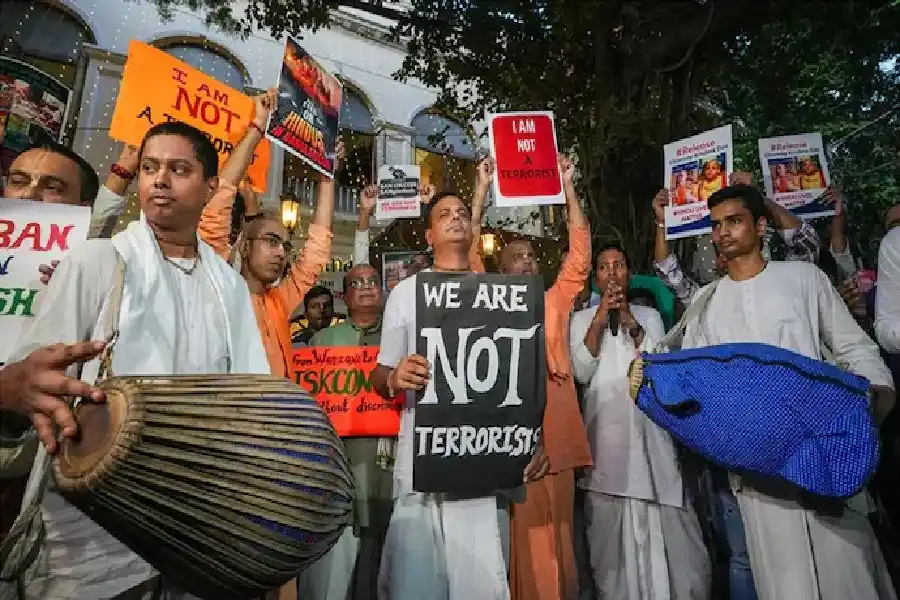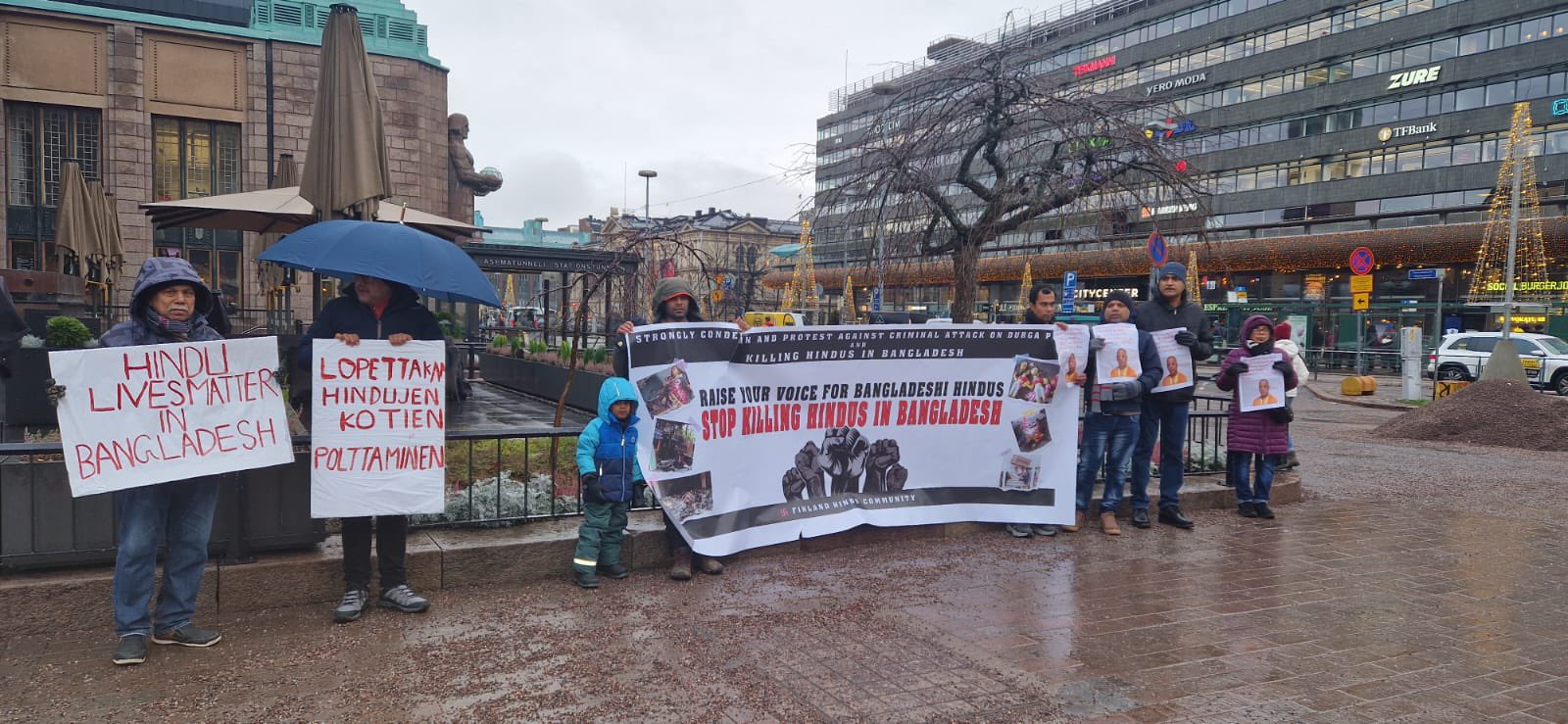.webp)
Uzma Khatoon
Islamic teachings emphasize equality and social justice, asserting that all individuals are equal in the eyes of Allah, regardless of race, gender, or social status. This principle is foundational in Islam, as illustrated by the Quran and the practices of Prophet Muhammad, who advocated for fairness and inclusivity. However, the current situation in Bangladesh presents a stark contrast to these ideals.
The persecution of Hindus, including arrests and violence against religious leaders like Chinmoy Krishna Das, highlights a deviation from Islamic principles. Extremist factions have intensified attacks on Hindus, creating an atmosphere of fear and insecurity. These contradict the Islamic values of justice and compassion, which call for the protection and fair treatment of all individuals, regardless of their faith.
The international community, including India, has expressed concern over these incidents. This ongoing crisis underscores the need to reaffirm Islamic teachings and ensure these are reflected in societal practices and foster harmony and respect among diverse communities.
Prophet Muhammad’s interactions with non-Muslims were marked by justice, respect, and compassion. The treaties and alliances he formed with non-Muslim tribes, such as the Charter of Medina, created a framework for peaceful coexistence and mutual benefit.
Muhammad emphasized fair treatment for all, including non-Muslims, and his actions during the Conquest of Mecca, where he granted amnesty to his former enemies, showcased his capacity for forgiveness.
He allowed religious freedom and protected the rights of non-Muslims to practice their faith, as demonstrated by his interactions with the Christian community of Najran. Muhammad’s trade and social engagements with non-Muslims also highlighted the potential for cooperation and peaceful coexistence, even in a society with diverse religious beliefs.
Justice in Islam emphasizes this equality as well. Unlike empires before Islam where the powerful were often immune to punishment, Islamic law applies to everyone equally. Prophet Muhammad declared, "If I have taken anyone’s property, here is my property; take from it. And if I have struck anyone, let him take retribution from me before the Day of Judgment." In another example, Caliph Umar corrected his anger by allowing someone he had wronged to retaliate, illustrating accountability even for the most powerful figures.
 ISCKON Bangladesh that was sought to be declared a terrorist organisation
ISCKON Bangladesh that was sought to be declared a terrorist organisation
This spirit of equality extended beyond Muslims. For example, a non-Muslim once filed a complaint against Ali, the fourth caliph, and during the proceedings, Ali insisted both parties be addressed equally by name, not title, a request that was honoured. This commitment to treating all people fairly was a core value of early Islamic society, regardless of race, colour, or social class.
The Quran also promotes social equality and harmony, often calling for mutual respect, justice, and shared humanity. Questions arise about why some people are wealthier or more privileged, but the Quran addresses these differences in the context of fostering interdependence. Surah Az-Zukhruf states that the varied degrees of wealth and status among people help them serve one another. However, the ultimate value lies in one’s closeness to Allah and moral integrity, not their social or economic position.
This natural diversity does not justify unjust hierarchies. When leaders among the Quraysh tribe questioned the selection of the Prophet Muhammad, the Quran addressed this by underscoring that Allah’s choices are based on purity and devotion, not wealth or power. This view challenges any notion that honor is tied to material wealth or social status.
The Quran also reminds people that power and wealth are transient, as outlined in Surah Al-Hujurat, which states, "Verily, the most noble of you in the sight of Allah is the most righteous of you." This concept prioritizes moral character over arbitrary social distinctions, urging people to view one another with respect, regardless of status or wealth.
Islam allows private property, viewing it as essential to protect life and dignity. However, in Islam, property is considered a trust from God, with humans as trustees, not absolute owners. Property should be used responsibly, benefiting both the individual and society. Islam balances individual rights with societal needs, aiming to achieve fairness lacking in both capitalist and communist systems. It restricts property rights to prevent harm to others or society, asserting that community welfare can override individual interests if necessary.
This approach does not support exploitation for wealth accumulation. Prophet Muhammad’s life exemplified these ideals, advocating for the welfare of the poor and insisting on equal treatment for all. Surah Al-Baqarah highlights that the resources of the Earth are for all humanity, supporting a vision where resources are a shared inheritance. Islam calls for a balanced resource distribution, promoting concern for those less privileged.
The Prophet’s message of equality is underscored in his final sermon, where he declared, "There is no superiority for an Arab over a non-Arab nor for a non-Arab over an Arab; neither for a white over a black nor for a black over a white, except by piety." Here, moral character is emphasized over race or heritage, reinforcing unity and shared purpose among all people.
Islamic teachings on economic resources further stress justice. According to Islam, God owns all that is in the heavens and on Earth, with humans acting as trustees. Property has a social purpose and should not merely satisfy acquisitive desires; it should contribute to societal welfare. People can benefit from property as long as they respect God’s terms, using it without causing harm or injustice to others.
 Protest against incident of persecuriton in Bangladesh in Europe
Protest against incident of persecuriton in Bangladesh in Europe
Islamic law prevents harm to others through principles such as usufruct rights, which allow individuals to use property within certain limits. If someone dies without heirs, their property returns to the community. Abuse or misuse of property can also restrict rights, balancing personal and societal interests. This balance discourages monopolies and exploitation, encouraging wealth to be used responsibly, often for charitable purposes.
Zakat, the obligatory charity, and voluntary donations are central to Islamic social responsibility. Essential resources like water and pasturelands are public property to ensure equitable access. The Islamic economic system discourages harmful practices, such as hoarding or price manipulation, to protect society.
The Quran encourages fairness by directing those with wealth to support the less fortunate. Surah Al-Balad challenges believers to show empathy by "feeding on a day of severe hunger, an orphan of near relationship, or a needy person in misery." This verse underscores that righteousness includes helping those marginalized by society, and promoting a sense of collective compassion and justice.
Islam encourages both personal effort and social responsibility. Individuals are urged to work hard and develop their talents ethically and with consideration for others. An ideal society provides equal opportunities, allowing everyone to reach their potential. Islam advocates for a merit-based society, where any differences in success result from personal choices, not barriers. In contrast, an unjust society blocks opportunities based on biases like race or wealth, contradicting Quranic teachings.
The Quran’s insistence on justice, equality, and mutual respect underpins Islam’s vision of a fair society. Islam firmly opposes discrimination based on race, colour, or economic status, urging believers to act justly and reject oppression. This message is reinforced in the Quran, which advises, "And do not incline to those who do wrong, lest you be touched by the Fire" (Quran 11:113). Wealth and power should serve justice, not oppression, guiding believers to act ethically, support the less fortunate, and strive for a just society.
Islamic teachings emphasize equality, justice, and compassion, principles that are fundamentally opposed to the persecution of any group based on religion or ethnicity. The recent violence against Hindus in Bangladesh starkly contradicts these values. The Prophet Muhammad advocated for the protection of all individuals, regardless of their faith, and emphasized treating others with respect and fairness. The ongoing attacks on Hindu communities, including arrests and violence against religious leaders, highlight a deviation from these core Islamic principles. Such actions not only undermine the teachings of Islam but also threaten social harmony and justice. The Quran calls for believers to uphold justice and reject oppression, urging them to act ethically and support the less fortunate.
This message is particularly relevant in addressing the plight of Hindus in Bangladesh, where extremist actions have created fear and insecurity among minority communities. The international community has expressed concern over these human rights violations, urging Bangladesh to uphold its commitment to protecting minority groups. In light of Islamic teachings, societies must reflect on these principles and ensure they are applied universally. The situation in Bangladesh serves as a reminder of the need to reaffirm the values of equality and justice that Islam champions, fostering an environment where all individuals can live with dignity and respect. By adhering to these ideals, societies can work towards a more just and compassionate world, aligned with the true spirit of Islam.
Dr.Uzma Khatoon has taught at the Aligarh Muslim University.
